This is not "their" fight, but "ours": Kazakhstan uprising - not protesters, but revolutionaries
The election is just an illusion, and even some protests are just performances.
Exiles living abroad direct people at home to perform insignificant gestures that have no significance for change.
There is no real opposition party. Overseas dissidents compete with each other for visibility, blame each other, and "catch each other's spies"...
This is the norm. It is this normality that makes today’s massive, spontaneous uprising unprecedentedly alarming.
This uprising is important to China’s dissidents and rebels because we all face the same situation, whether it’s a long-term sociopolitical situation or a short-term, rapidly growing, looming disaster. This is also why IYP has published multiple articles analyzing China’s economic situation.
Please open your horizons and let your role get rid of the status of "bystander" before you can appreciate the meaning.
📌 It is highly recommended that you click on the embedded link to view the relevant specific content to help you deeply understand the purpose of producing this article.
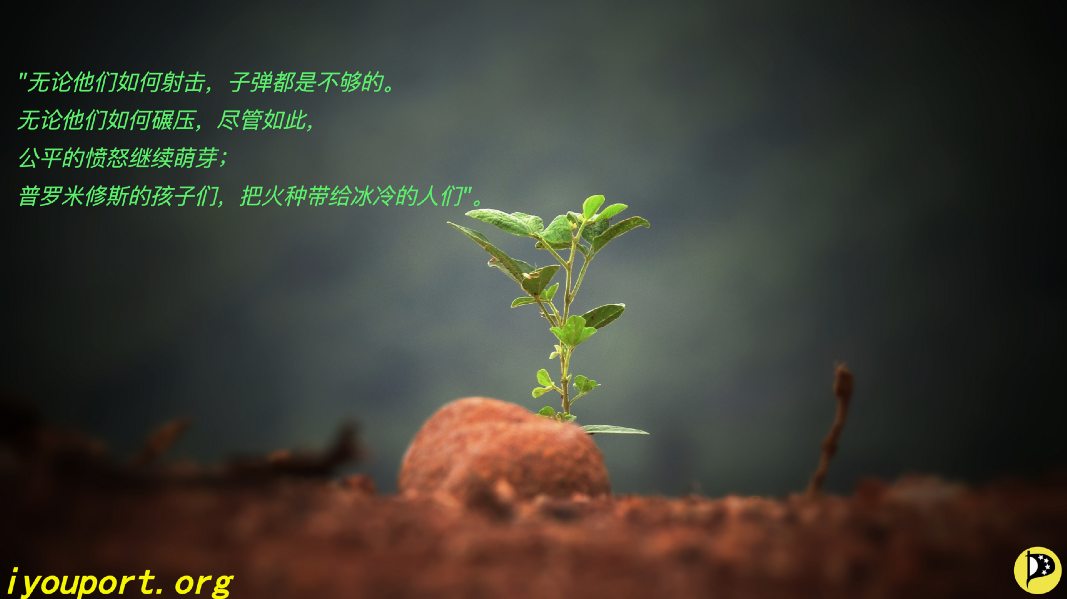
A full-scale uprising broke out in Kazakhstan in response to the rising cost of living and the violence of the authoritarian government.
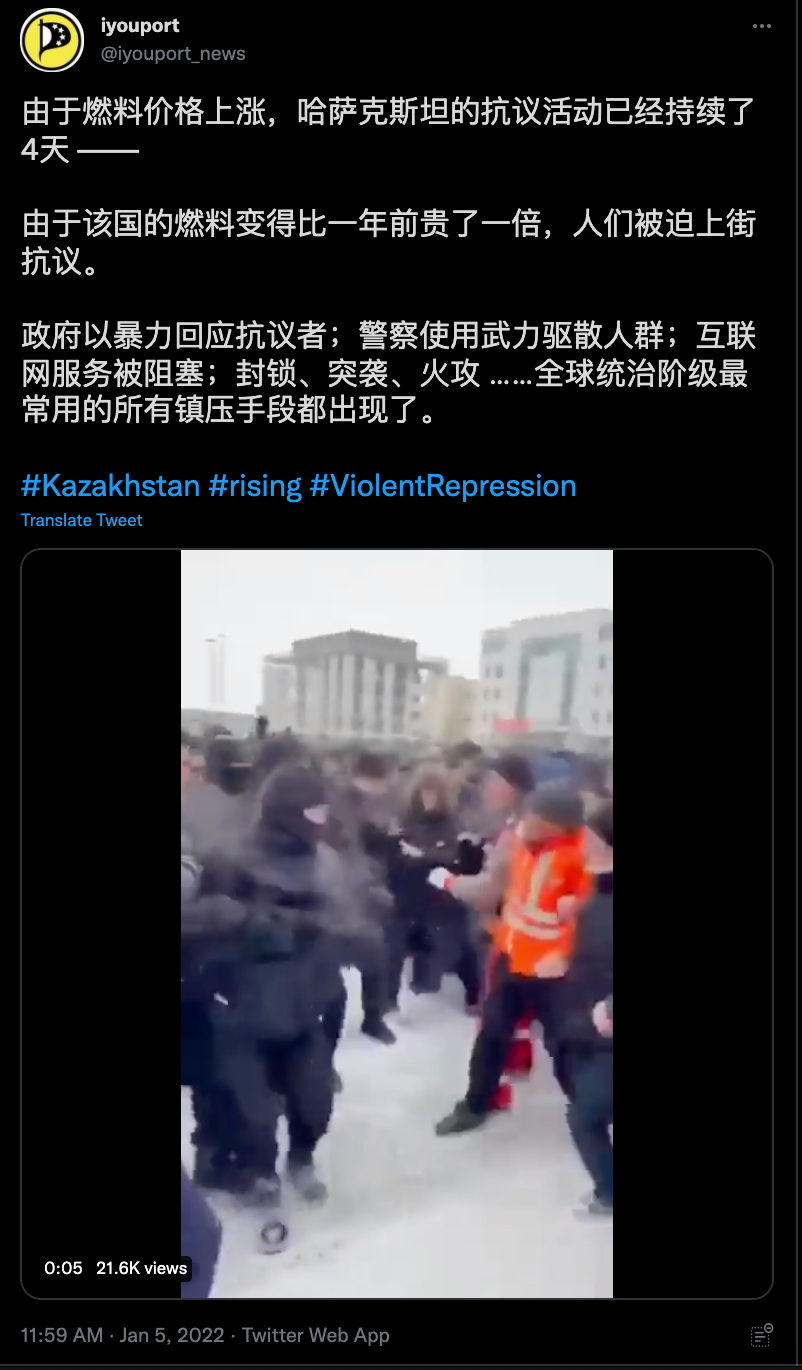
Demonstrators occupied government buildings in many parts of the country, particularly in Almaty, the most populous city, where protesters temporarily occupied the airport and set fire to the parliament building.
At the time of publication, the police responsible for the crackdown had retaken central Almaty, killing at least dozens of protesters in the process, while troops from Russia and Belarus arrived to join them in suppressing the protests. .
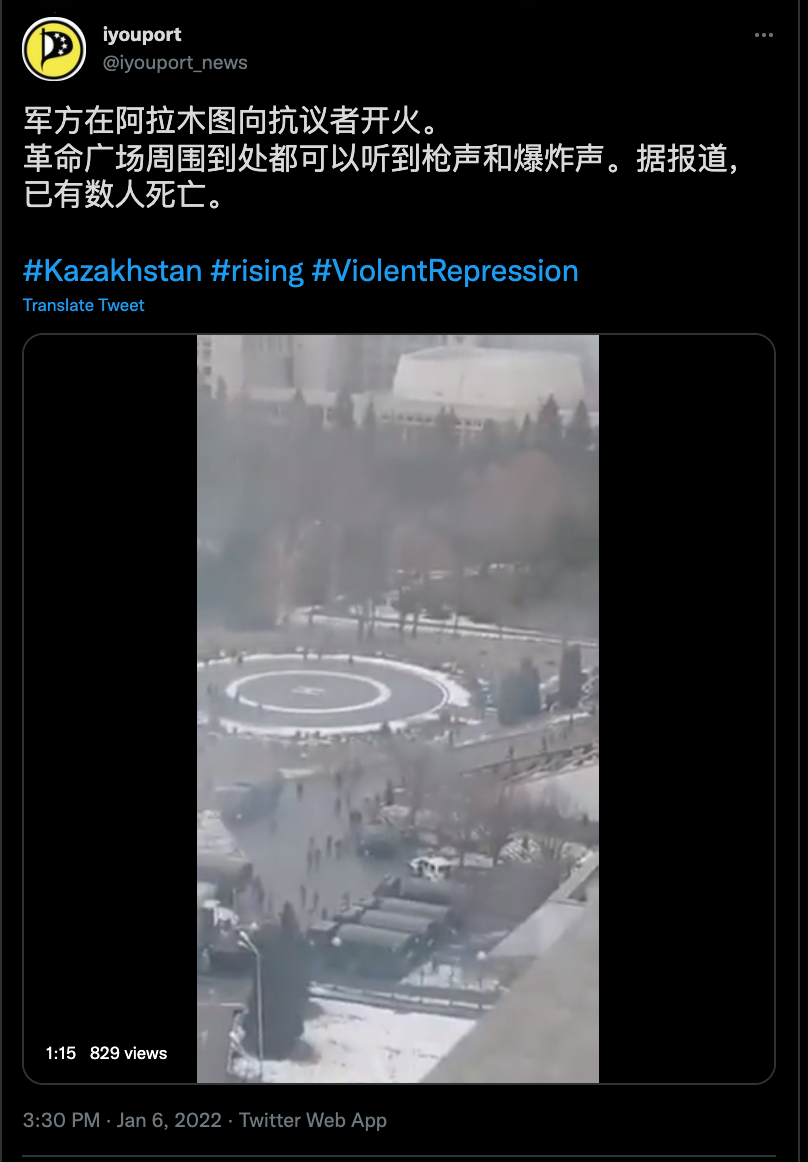
The following report presents an interview with a Kazakh expatriate who explores what prompted the uprising in Kazakhstan and explores its impact on the entire region.
“What is happening now in Kazakhstan is unprecedented.
There were explosions throughout the night, police violence against people, and some protesters burning police cars, including a few random other cars. Now people are marching in the main streets and something is happening near Akimat (the parliament building)”.
— from an anarchist feminist in Almaty, the last message received before contact with her was lost shortly before 4pm (Eastern Kazakhstan time).
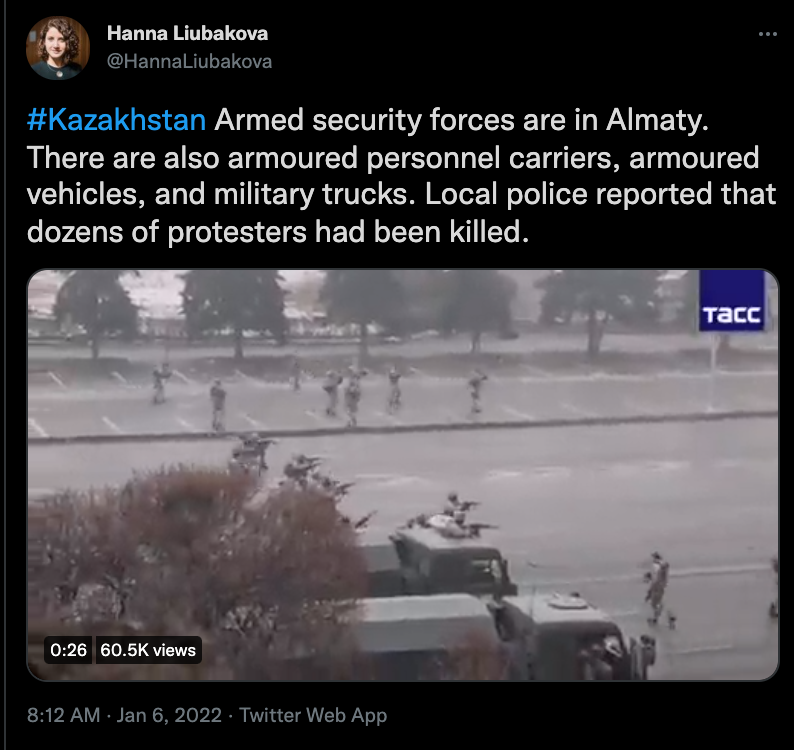
The uprising in Kazakhstan should be understood in a global context. It is not just a reaction to an authoritarian regime.
The protesters in Kazakhstan were reacting to the basic serious issue of rising costs of living that people around the world have been protesting for years.
Kazakhstan is not the first place to see a wave of protests over rising gas costs – similar protests have occurred in France , Ecuador and elsewhere around the world , under a variety of government and regime settings.
In other words, the significance of this particular uprising in Kazakhstan is not that it is unprecedented, but rather that it involves how people there face the same challenges that we all face, no matter where we live.
The urgency that Russia is taking to help suppress the uprising is also crucial. The Collective Security Treaty Organization (CSTO), a military alliance of Russia, Armenia, Belarus, Kazakhstan, Kyrgyzstan and Tajikistan - with Russia calling the shots - has pledged to send troops to Kazakhstan. This is the *first* time that the CSTO has deployed troops in support of a member state; note that as recently as 2021, the organization refused to aid Armenia during its conflict with Azerbaijan.
It is instructive that the *war* between Armenia and Azerbaijan did not require CSTO intervention, but a *powerful protest movement* did.
As with other imperial projects, the main threat to Russia's sphere of influence (the "Russian sphere") was not war but revolution.
Russia has benefited greatly from Syria's civil war and Turkey's invasion of Rojava , gaining a foothold in the region by pitting Syria and Turkey against each other. One of the ways Vladimir Putin has wielded power in Russia is by rallying Russian patriots to support his wars in Chechnya and Ukraine.
War—continuous war —is part of the Russian imperial project, just as war serves the American imperial project in Iraq and Afghanistan . "War is the health of nations": as Randolph Silliman Bourne said .
On the other hand, an uprising must be suppressed by any means necessary. If the millions of people in the “Russosphere” struggling under the twin forces of corruption and neoliberalism see a successful uprising in any of these countries, they will rush to follow suit. Looking at the wave of protests in Belarus in 2020 and Russia a year ago , we can see that many people are inclined to do so even if there is no hope of success.
In capitalist democracies, elections can replace one group of self-righteous politicians with another , and the illusion of choice itself can distract people from taking action to bring about real change. In authoritarian regimes like Russia, Belarus, and Kazakhstan, there are no such illusions; the ruling order is imposed simply by desperation and brute force. In this situation, anyone can see that revolution is the only way out. In fact, the rulers of all three countries owe their power to the revolutionary wave that began in 1989 and led to the collapse of the Eastern Bloc . We can hardly blame their subjects for doubting whether revolution would change their circumstances .
Revolution – but to what end? We cannot share the optimism of liberals who believe that social change in Kazakhstan will be as simple as ousting the dictator and holding elections. It's far from that simple. Without radical economic and social change , any purely political change will keep most people subject to the neoliberal capitalism that is trapping them today . Vicious cycle.
Putin will not give up easily under any circumstances. Real social change - in the Russian sphere as in the West - will require a lasting struggle. Overthrowing the government is necessary, but it is not enough: to withstand future political and economic impositions, ordinary people will have to develop collective power on a horizontal, decentralized basis. This is not the work of a day or a year, but of a generation .
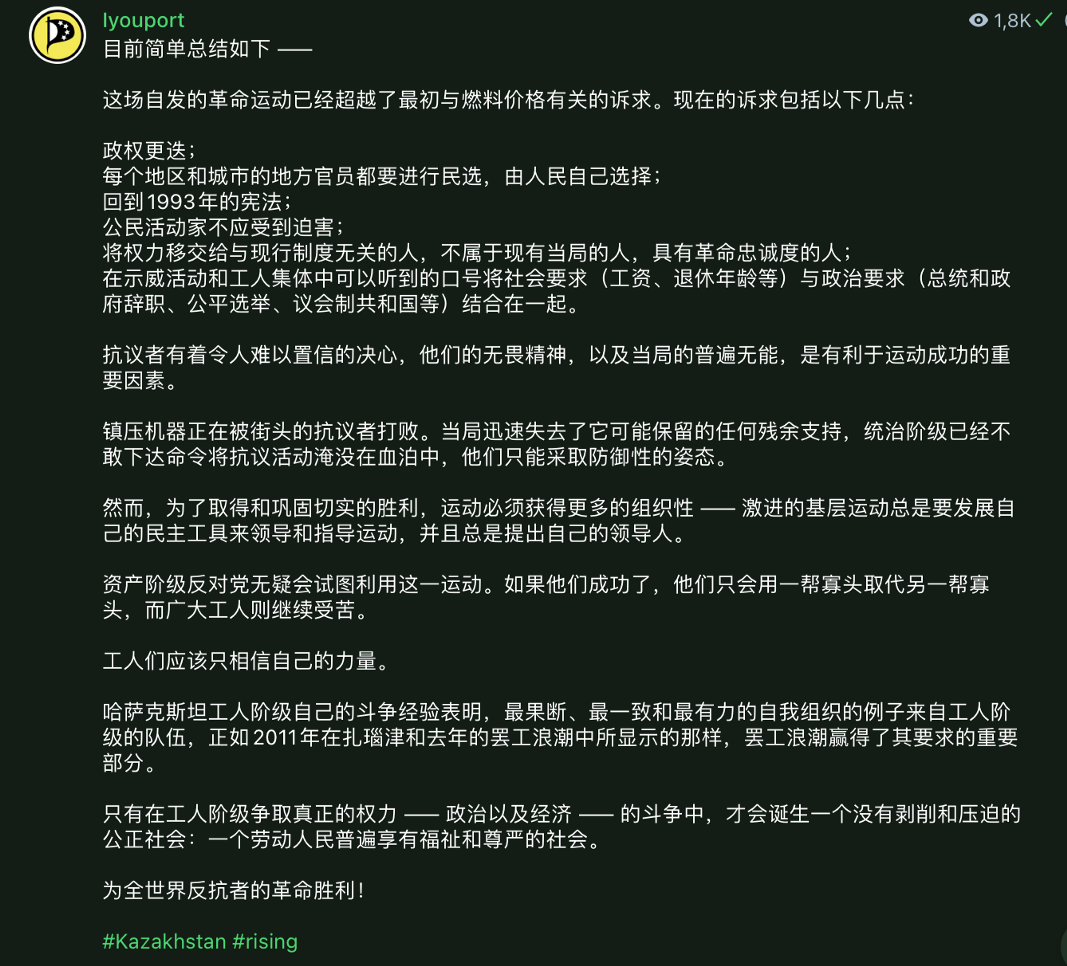
Anarchists' contribution to this process is that the same structures and practices that we develop in the course of our struggle against our oppressors should also help us create a better world.
Anarchists have already played an important role in the uprising in Belarus , showing the value of horizontal networks and direct action . The liberal dream of reshaping the entire world in the image of the United States and Western Europe has proven hollow—and the United States and Western Europe are implicated in many of the reasons why efforts to realize that dream have failed. The anarchist dream has yet to be attempted.
In response to events in Kazakhstan, some so-called "anti-imperialists" have once again parroted the idea that opposition to any regime aligned with Putin's Russia can only be the result of "Western intervention." This is particularly egregious at a time when countries within Russia's sphere of influence have largely abandoned any pretense of socialism and surrendered themselves to the kind of neoliberal policies that sparked the Kazakhstan uprising.
In a globalized capitalist economy, we are all subject to the same effects of profiteering and instability , and we should not allow ourselves as citizens to be manipulated by hostile world powers . We should see through this whole charade. Let us build common cause across continents , exchanging strategies, inspiration and solidarity to reinvent our lives.
The ordinary people of Kazakhstan who rose up this week showed just how far we can go — and how far we must go *together*.
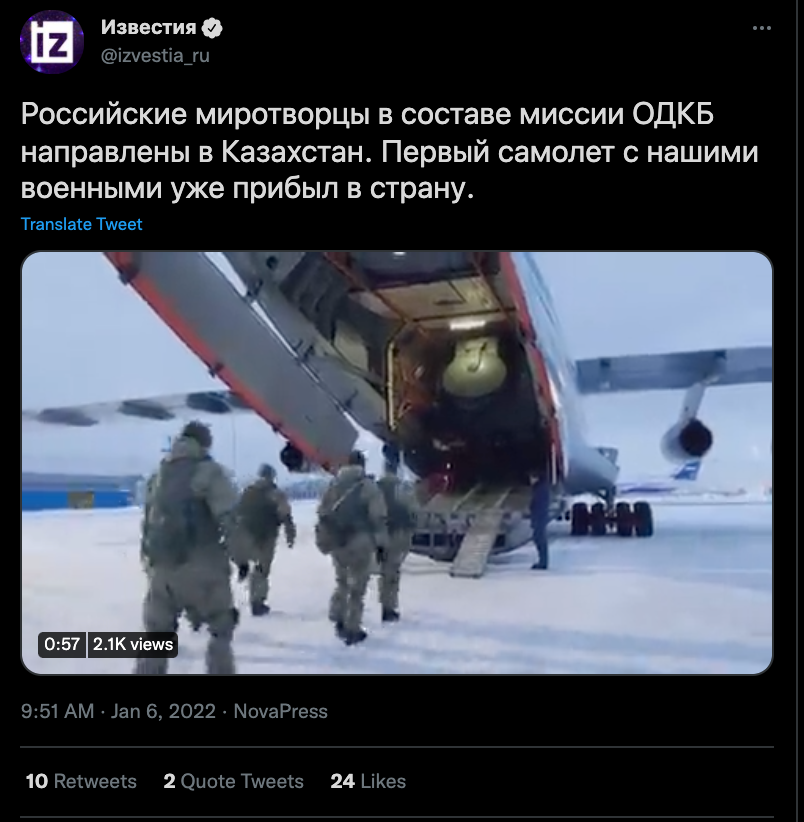
( Video of Russian troops heading to Kazakhstan )
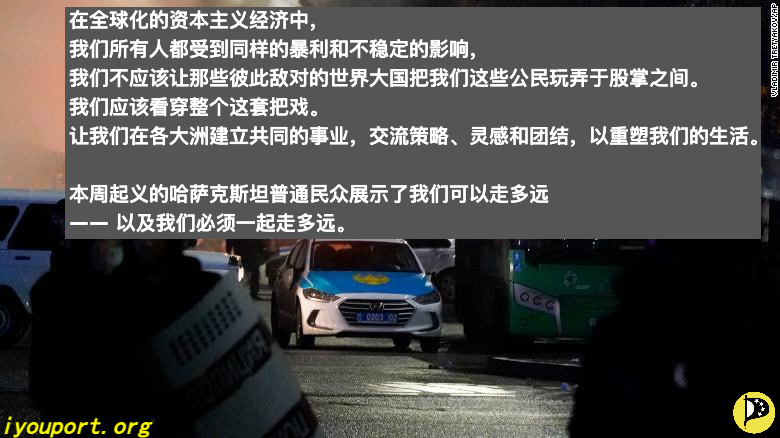
The background to the uprising
Earlier on January 6 (Eastern Kazakhstan time), after a network outage prevented the completion of interviews with participants in the Almaty protest movement, the following was conducted with a Kazakhstani anarchist advocate living abroad. interview.
Q: For context, what anarchist, feminist and ecological projects or movements are there in Kazakhstan in the 21st century?
A: Early on, there was opposition to the first former communist president, Nursultan Nazarbayev, who would eventually lead Kazakhstan in the post-Soviet era. Starting in the mid-1990s, he began to become more authoritarian, changing governance structures to gain stronger presidential powers. This has earned Nazarbayev opponents from across the political spectrum among the political elite. Astonishingly, communists, social democrats, centrists and pro-business figures collaborated to call for a more democratic constitution that would limit presidential power.
As for the movements below, there were anarchists, who were more of an underground movement, and a socialist movement, whose leaders ended up fleeing Kazakhstan. There are also nationalists and radical Islamists, but again, they are not that popular and they are also underground movements.
As for environmentalists, if they do get some public attention, it comes mostly from advocacy groups. In Kazakhstan, only about six registered parties are allowed to participate in elections; the rest are rejected. However, there are many advocacy groups.
The government has never allowed any real opposition to participate in elections since the 2000s. The candidates have different faces but the same ideas to make it look like a "competitive" political environment where one strongman keeps winning all the time , similar to that of Russia, Belarus and other authoritarian post-Soviet countries Condition. Simply put, the election is just an illusion.
Q: Are there any opposition parties in Kazakhstan?
A: Regarding opposition parties, there are basically none in Kazakhstan. As early as the 1990s and 21st century, there used to be such political parties, but they were blocked or banned by the government. Today, there are people who claim to represent the opposition, but they simply live abroad, such as in Ukraine. They don’t have any real connection to the streets.
[Note: This is very similar to China. 】
There is also a certain competitive relationship among these dissidents living overseas. I saw them all accusing each other of cooperating with the government . They try to lure disgruntled citizens into doing things that don't actually pose any threat to the government, things that give the *illusion* of making a change, like telling people to engage in peaceful dialogue with local officials, or by deliberately sabotaging ballots to participate in the elections, to "protest" the elections - and so on, all they suggest are tactics designed to give the *illusion* of fighting the government, when in fact it is just a waste of time .
In recent years, this kind of performative opposition has actually begun to appear in the country ; random activists appear out of nowhere to form political movements and hold pickets. These people have not experienced any form of persecution, while ordinary people only need a little Those who protest will be immediately detained by the police. [Not only are the votes fake, but the protests are also performances. 】
This type of performative dissent is controlled “opposition.”
One unusual opposition group - I couldn't tell if it was a controlled opposition - was called Democratic Alternative for Kazakhstan. It was led by a businessman living in France named Mukhtar Ablyazov. If you search for his name, you'll see articles about alleged money laundering cases and lawsuits. He was a minister in the 1990s (Forces for Health in the System); when he joined the opposition, he was eventually imprisoned by the Kazakh government. He was later released, but eventually fled Kazakhstan and lived in exile. Since then, his political opposition has received the most support on social media. Most people associated with his movement have been persecuted and arrested; this has been happening since 2017. Every protest he directed from abroad was suppressed, with heavy police presence in public areas. There have been nationwide internet shutdowns.
In any case, what is happening now in Kazakhstan is completely unexpected.
Q: What tensions existed within Kazakhstan before these events? What are the fault lines in Kazakh society?
A: What really aroused the public was the incident in the town of Zhanauzin. The town produces oil profits, but its people are among the poorest in the country. The town is famous for the bloody events in 2011, when a labor strike took place and the government ordered police to shoot people.
That tragedy has remained in the minds of the people, especially among the town's residents, and since then there have been more small strikes in the oil industry there - although these were peaceful and did not result in bloodshed. .
Strikes and protests have become more common there since 2019. At the same time, people are becoming more politically active across the country due to economic factors, as oil prices around the world have plummeted, impacting Kazakhstan's economy. As Kazakhstan's currency, the tenge, becomes weaker, people can afford less and less.
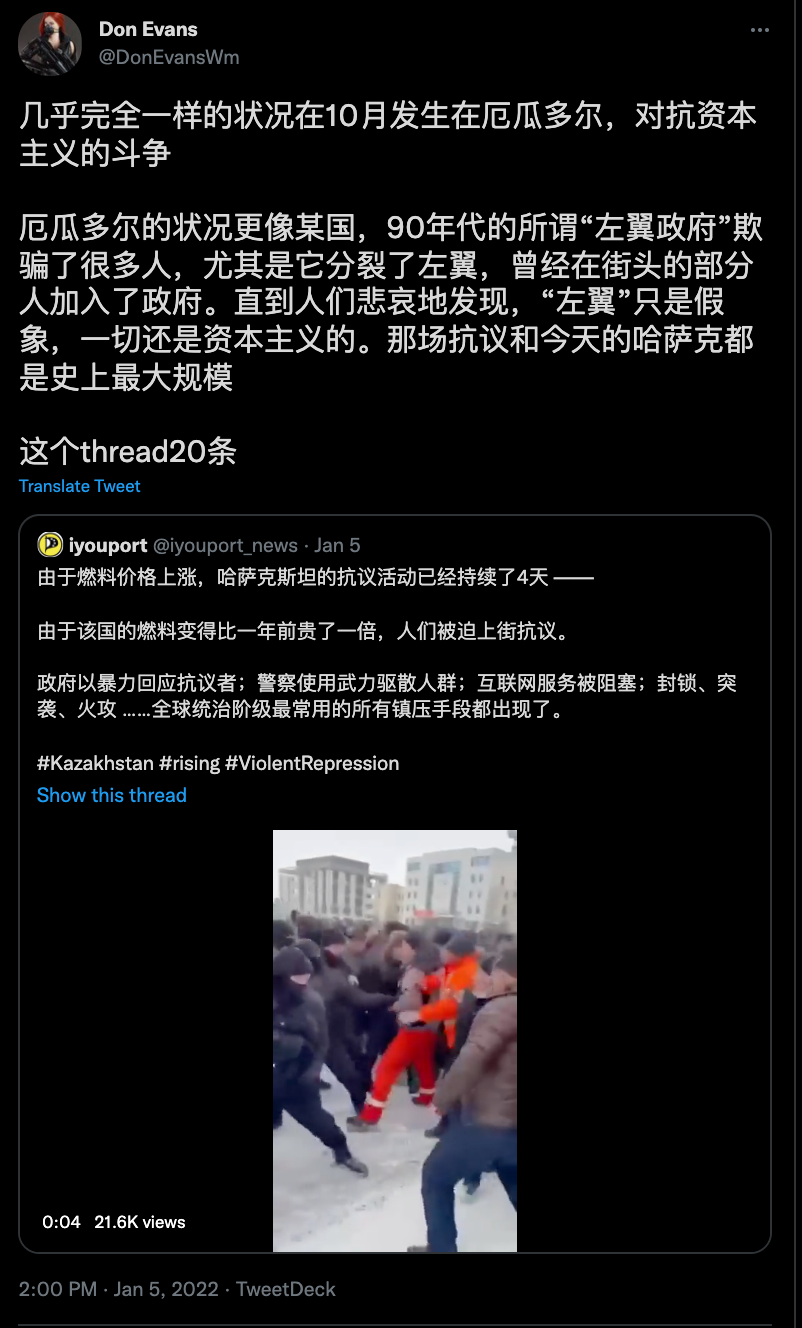
Kazakhstan also has serious problems: villages lack clean water, the environment is polluted, people live in debt , and there is deep corruption and nepotism in a system where any dissent can be easily silenced. Most people continue to live in these conditions while the economy works for billionaire Kazakh businessmen with ties to government officials and other prominent figures .
In the early 2000s, people saw a glimmer of hope as Kazakhstan's economy grew due to natural gas reserves; as a result, many people's living standards improved. But that all changed dramatically in 2014, when global oil prices fell and the war in Ukraine led to sanctions on Russia — which had an impact on Kazakhstan because of its dependence on Russia.
There were some small-scale protests from 2014 to 2016, but they were easily suppressed. In 2018 and 2019, protests grew even more, thanks in part to Mukhtar Ablyazov, the aforementioned opposition businessman living abroad who used social media to gain traction. Political protests and events are organized under the banner of the Democratic Alternative for Kazakhstan (Qazaqstannyń Demokratııalyq Tandaýy, QDT) party.
After 2020, when the COVID-19 pandemic hit, things got worse. People have lost their jobs; some have no way to pay for basic necessities and receive very little support from the government, while epidemic prevention restrictions have made people more frustrated and distrustful of the government. Then commodity prices rise, especially food prices - this happens all over the world, but for Kazakhstan its impact was quite large and catastrophic.
Back in the bloody town of Zhanauzin, where the fuel is actually produced, the price of gas has skyrocketed. That cost had been rising steadily over the past decade, but when the government stopped subsidizing it and let the market decide , prices finally grew even more.
There were already small protests on the issue in that city, but on January 1, 2022, the price of liquefied gas used to power vehicles unexpectedly doubled. This angered people. People held massive protests in the square. Law enforcement appeared hesitant to break up the protests. Other villages in the province also rose up and began blocking roads in protest. Then, within days, the protests spread across the country.
It started as a protest against rising fuel prices, but then mostly because of the other issues I mentioned earlier. These issues have prompted people to go out on strike and take to the streets more often.
Q: Please describe the different agendas of the different groups on both sides of this fight. Are there identifiable activist factions or trends at the demonstrations?
A: Initially, the government ignored the issue of gas prices and tried to get people used to such high prices, even blaming consumers for high demand. Eventually, they lowered the prices, but that didn't stop the protests. The state then largely denied they were involved in keeping gas prices higher, but as protests intensified it began to make more concessions in an attempt to calm people down. For example, they promised policies to provide financial aid to people they had ignored for years.
But the protests have not stopped. Few people already trust or support the government. The people demonstrating just want a better life, like how they imagine people in developed European countries live. Of course, different people have different demands - some call for the resignation of the entire government, while others want a new democratic form of government, specifically a parliamentary form without an executive president, and still others want more jobs and industry and better social conditions.
Some of the most violent uprisings and looting took place in the old Soviet capital of Almaty, Kazakhstan's financial metropolis. People were looting stores and setting things on fire. They took control of local government buildings and set them on fire.
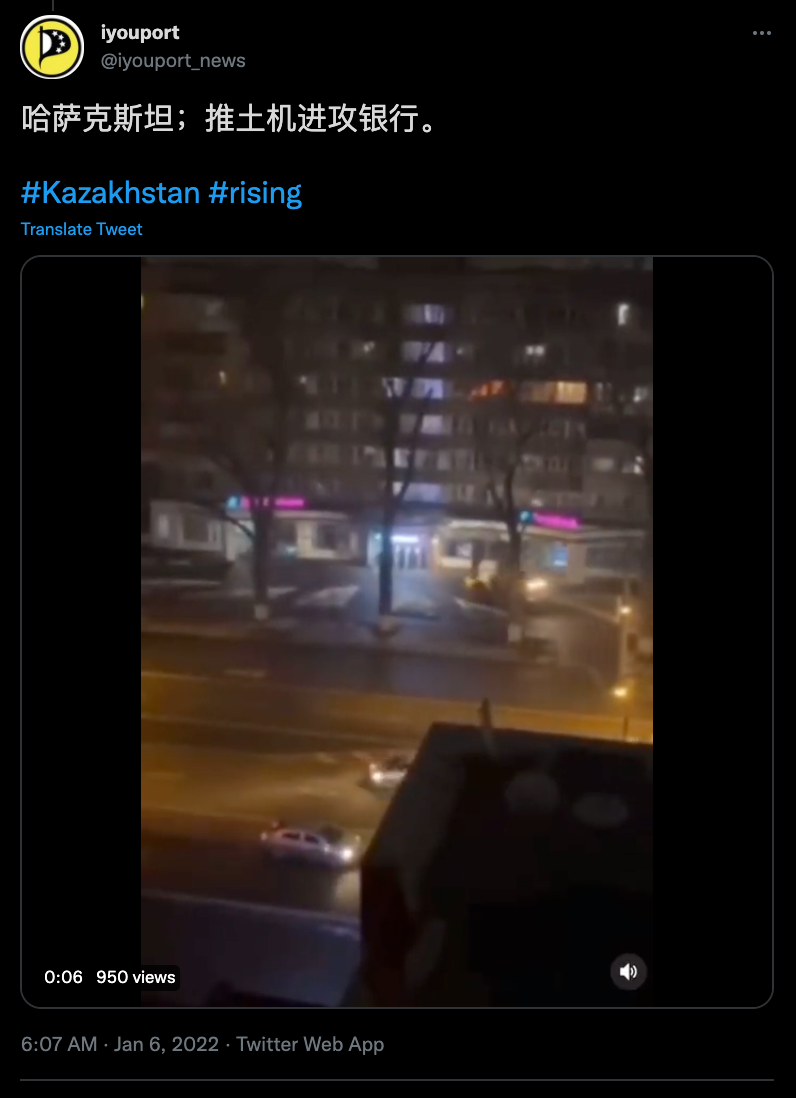
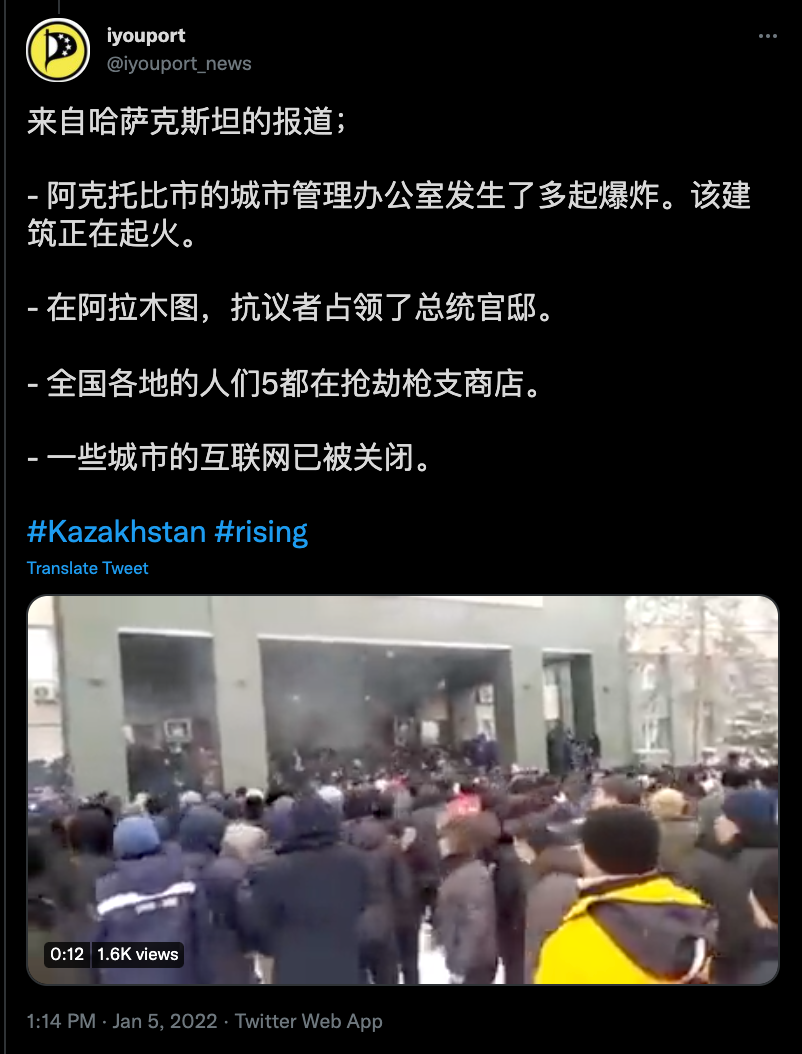
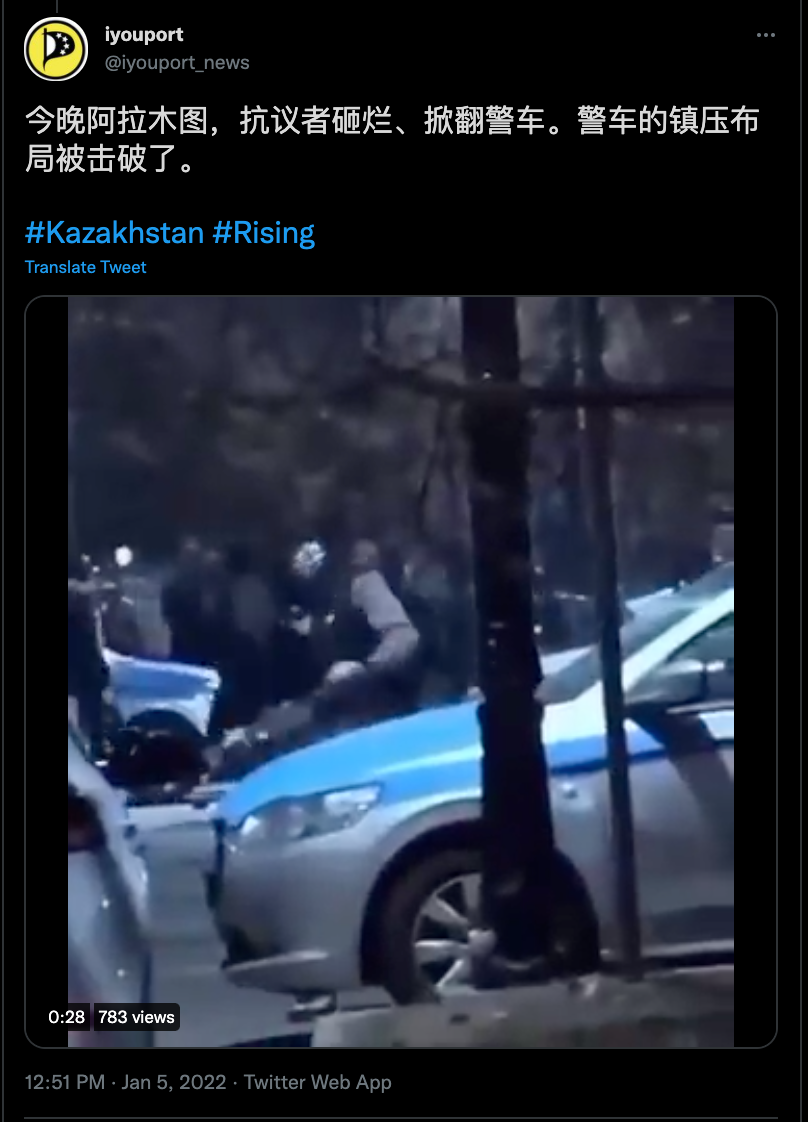
It is the government that has contributed to this situation because they have not met the demands to resign and form a new democratic political system.
Kazakhstan's current president, a close ally of former and first-term President Nursultan Nazarbayev, has added fuel to the fire by refusing to hand over power. The longer he holds out, the more violence will occur as neither the government nor the protesters can compromise.
Almaty has become destitute; no one seems to know who is in charge there now, as the mayor's office was burned down and the mayor himself disappeared from public view. The entire city was blocked by armed protesters.
Theoretically the city is under curfew, but in practice law enforcement is either non-existent or has joined the protests - so from what I hear the city is like a Commune [i.e. the Paris Commune ] . At this point , given how events unfolded, I wouldn't call the people there protesters, but rather revolutionaries — especially seeing the armed civilians there.
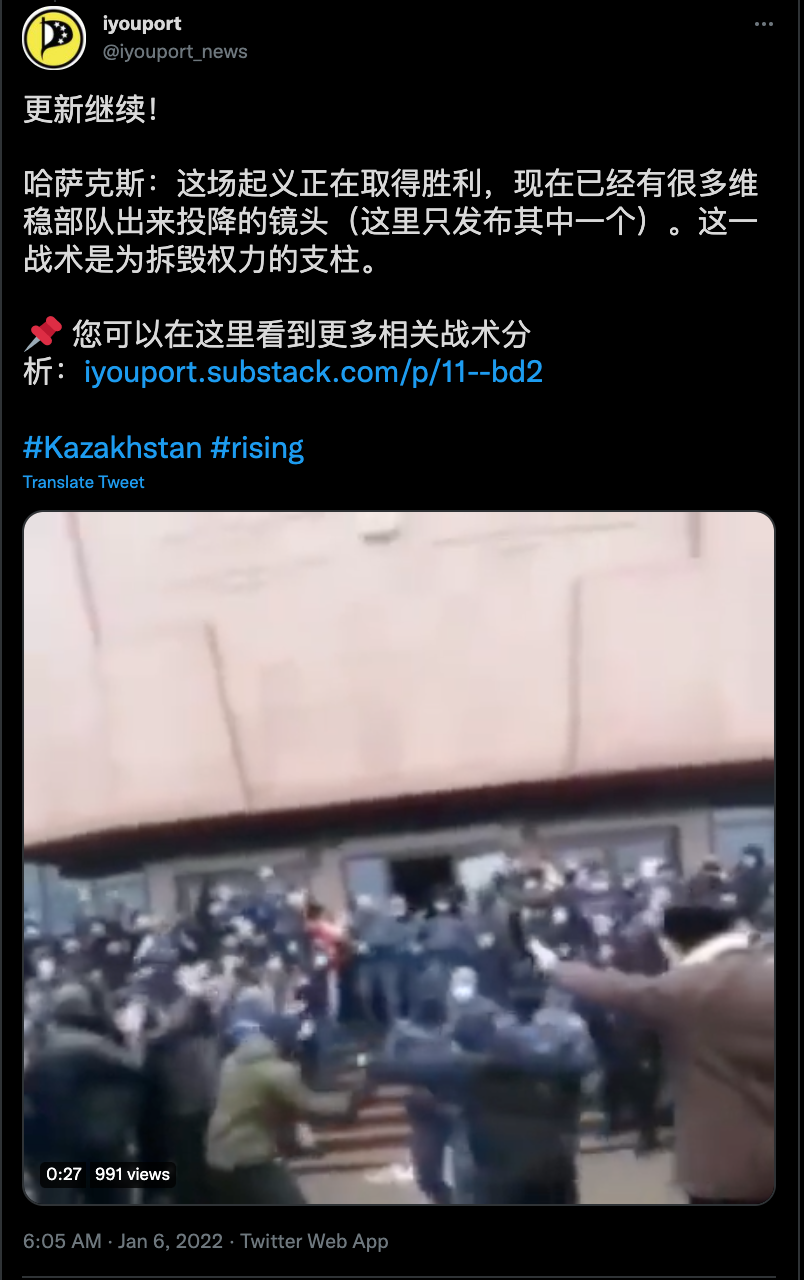
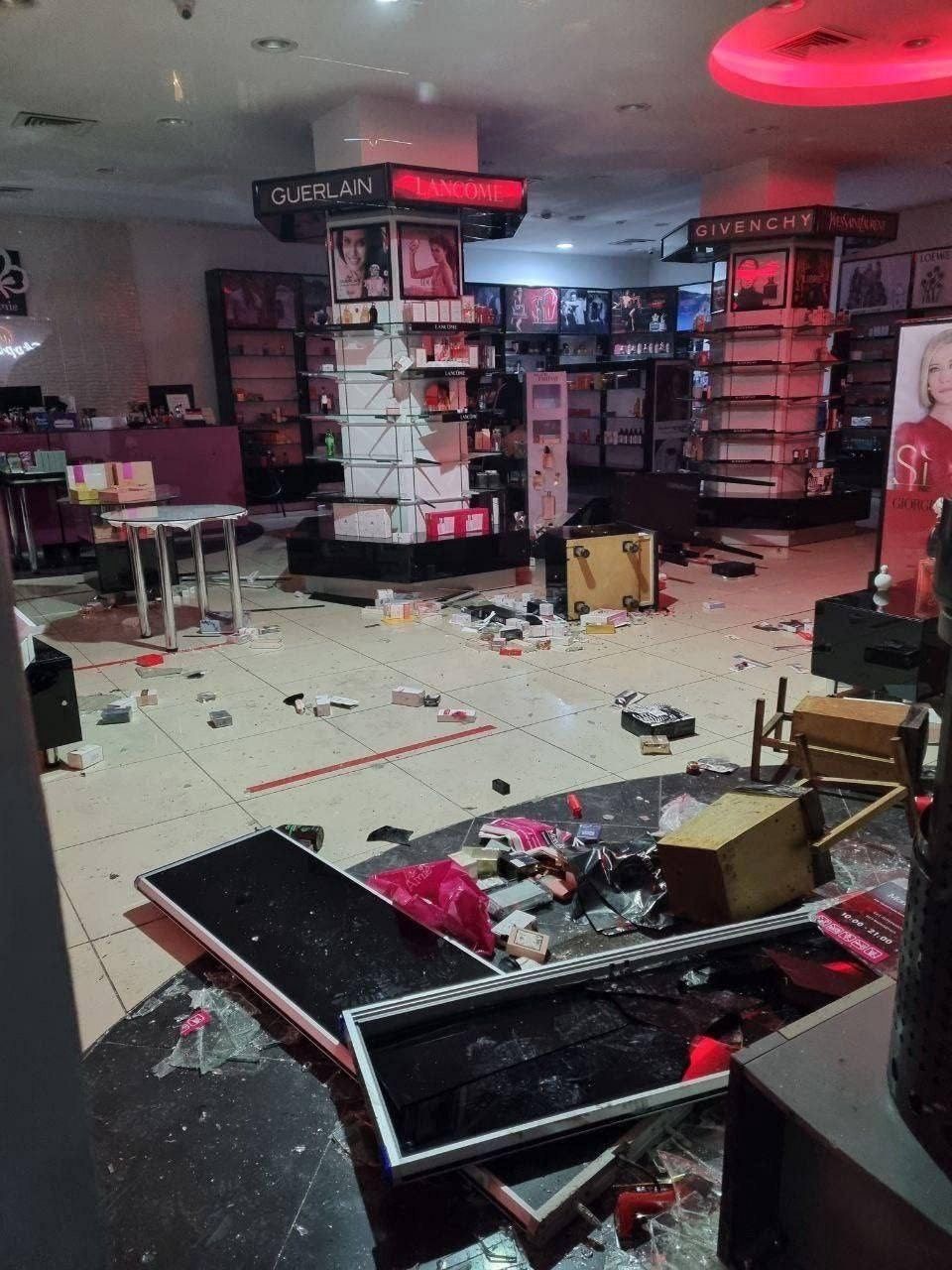
Q: Please introduce the event schedule for the past week.
A: The protests started on January 2 in the oil-producing town of Zhanauzin. By the next morning, other cities and villages in western Kazakhstan had begun protests in a show of solidarity.
The largest protests took place at night as the uprising spread to other cities, including Almaty. Late at night on January 4, people in Almaty marched to the main square in front of the city hall. A large police crackdown force is stationed there. Clashes broke out, but the protesters gained the upper hand.
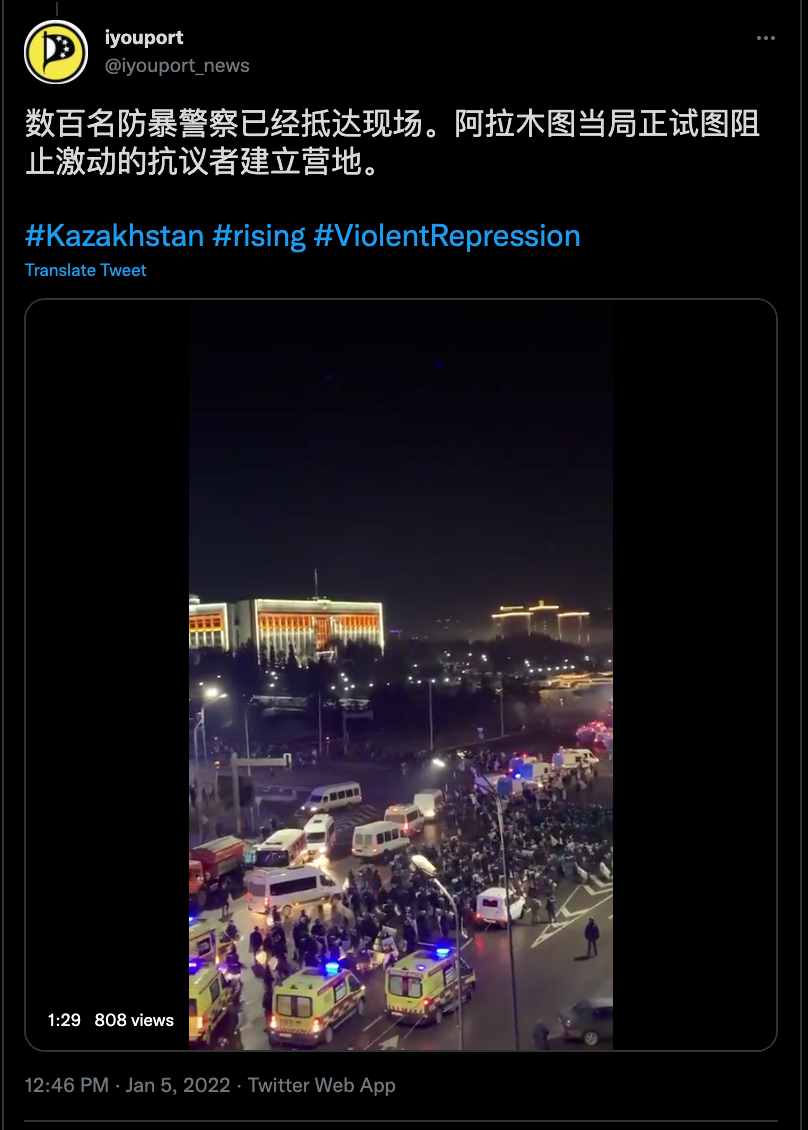
Protesters were dispersed in the early morning hours of January 5, but regrouped around 9 a.m. on a foggy morning. Some police officers even changed sides and joined the protests. Eventually, protesters marched to the square again around 10 a.m. and managed to break into City Hall and set fire to the building. Government stability officials fled Almaty, leaving the city under the control of protesters.
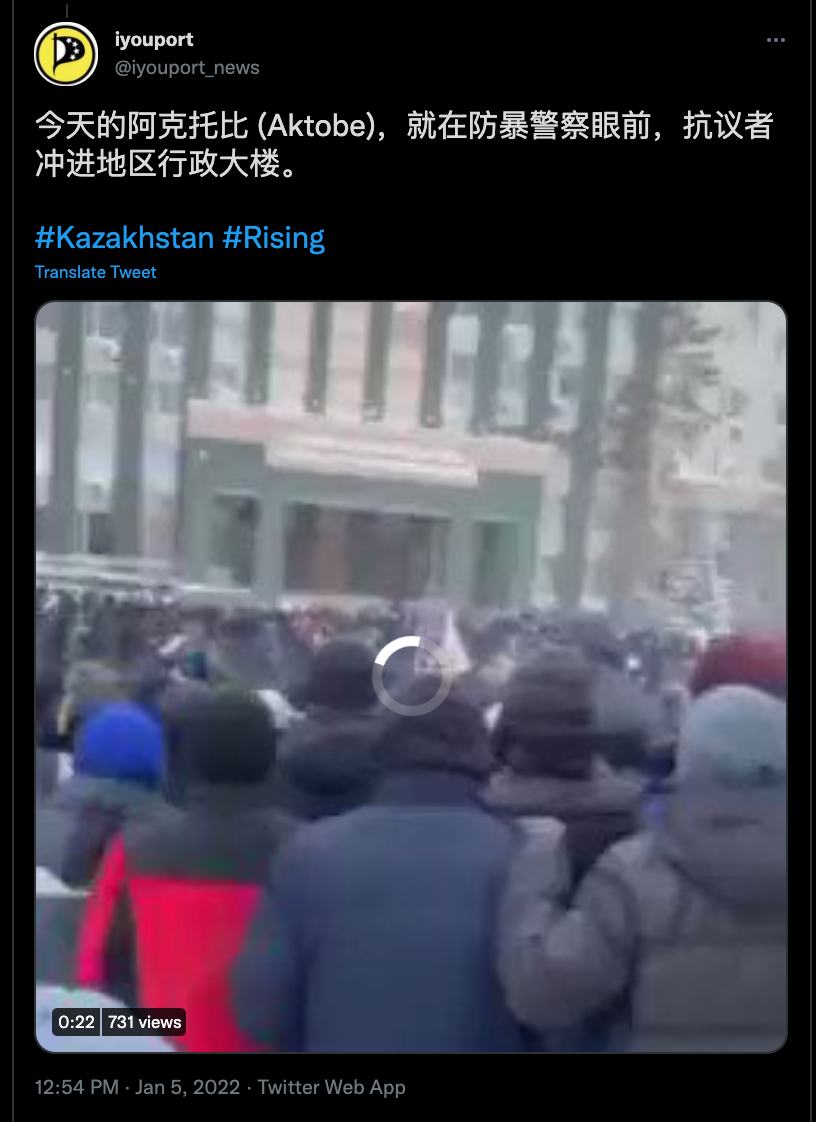
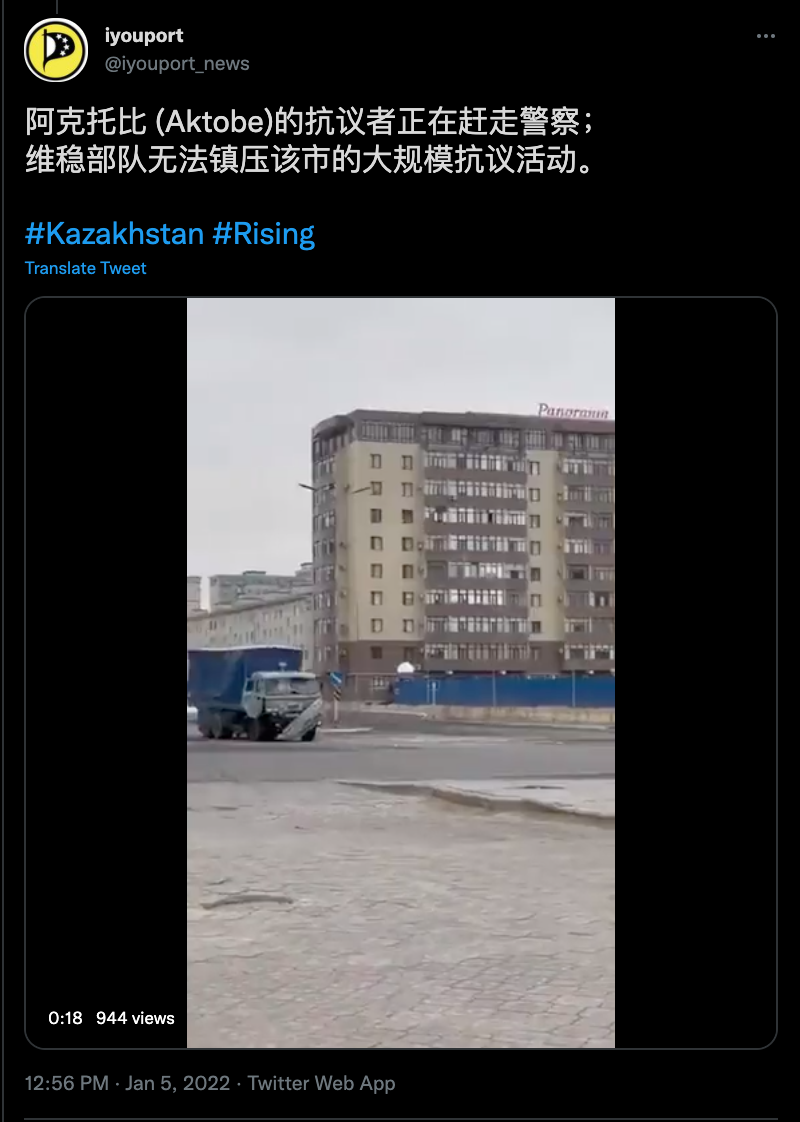
Since then, the president appears to have sent some more troops there to try to control the situation. I don’t know how things unfolded, but I heard that on the night of January 5th or early morning of January 6th, people started looting and stealing weapons, and there were reports of gunfire.
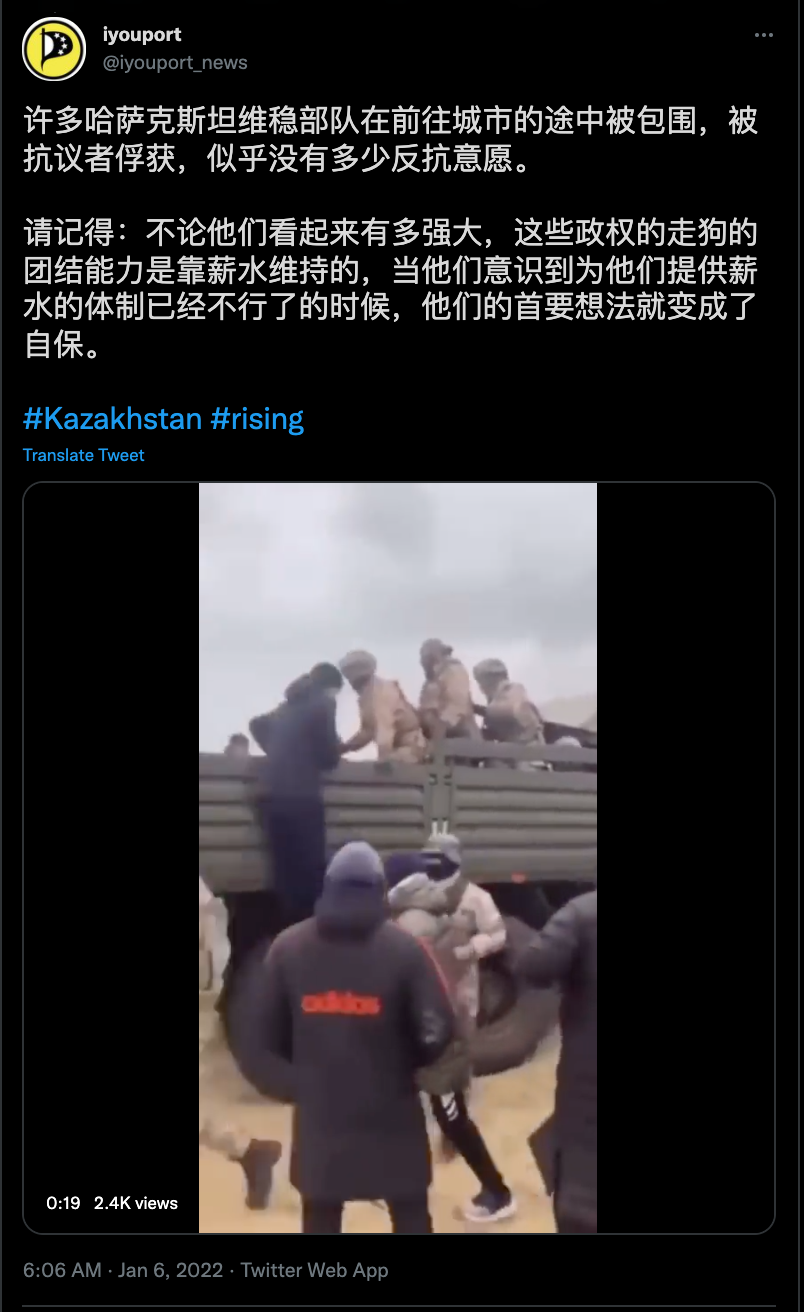
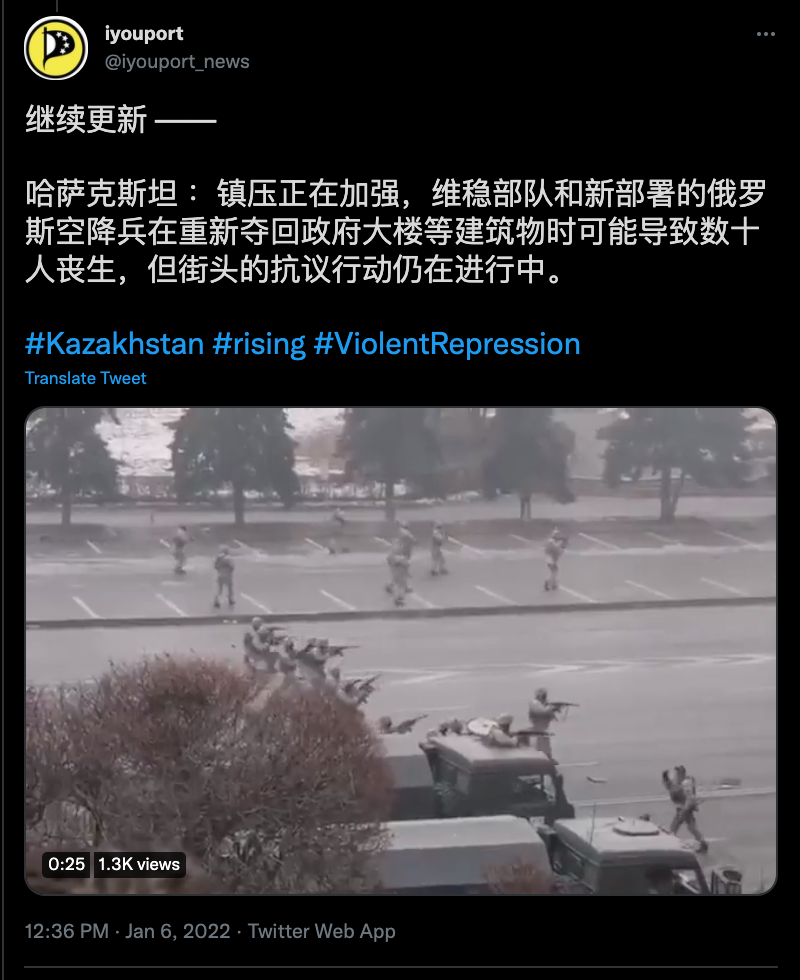
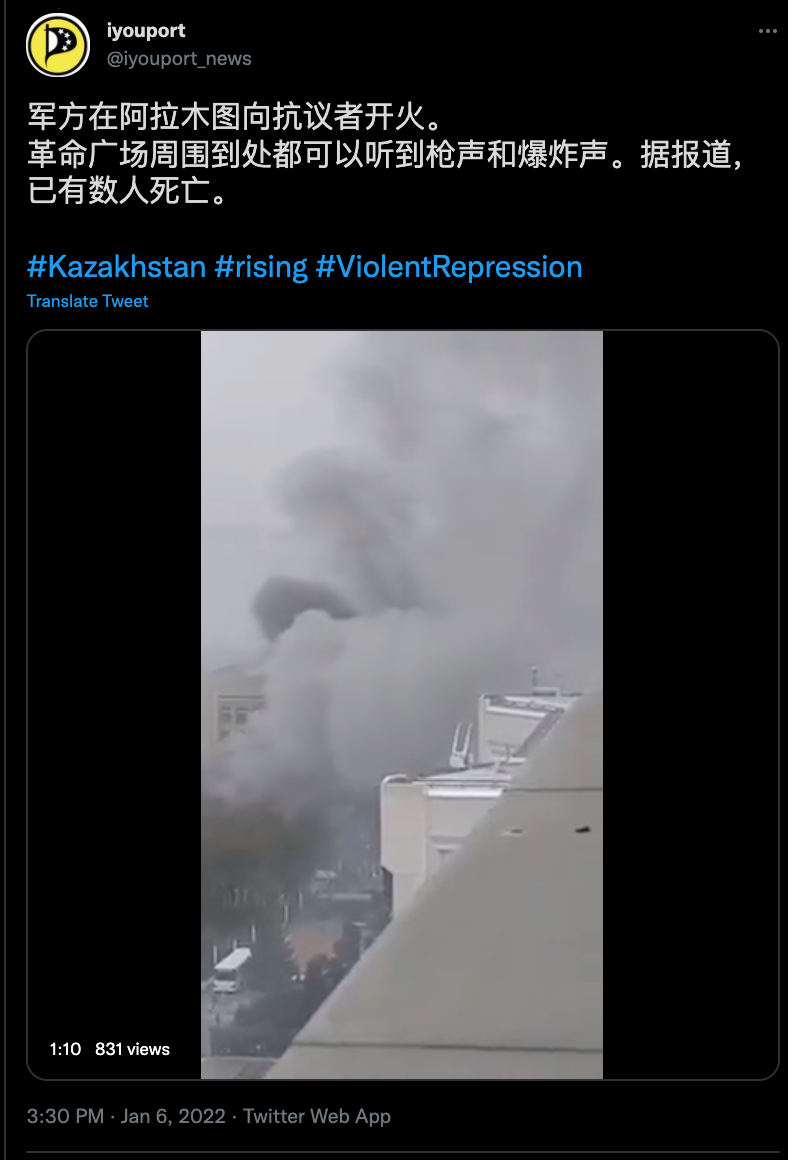
In other cities, the situation was more peaceful, with large-scale protests in squares. I think protesters have occupied local government buildings in several other major cities, but as far as I know those cities are less chaotic than Almaty.
In the capital, Nur-Sultan, it was calm but a large number of riot police were seen surrounding the presidential palace. Basically, the entire presidential palace was on lockdown.
In short, all of Kazakhstan is now like The Hunger Games. If you've seen the Hunger Games trilogy, or you know the basic synopsis of the plot, you know what I'm talking about - people are taking control of cities one after another; likewise, the president doesn't want to leave, doesn't want the opposition Reform the system. So if change doesn't happen, I expect more chaos until the government is overthrown or the protests are brutally suppressed.
Q: Do you think the participants in these protests have any reference points for the protest movements that have erupted in France, Ecuador and elsewhere around the world in response to rising fuel prices? What tactics did they use?
A: I think a lot of them were influenced by the protests that were happening in other post-Soviet countries like Belarus and Kyrgyzstan.
In Almaty, residents appeared to be following the example of neighboring Kyrgyzstan, where people also stormed the government and burned buildings — but the government was overthrown more quickly there than in Kyrgyzstan. Kyrgyzstan has experienced three revolutions to date; given its distance and cultural ties to Kazakhstan, since both countries speak Turkic languages, I think its example played an important role in Kazakhstan.
Q: What is most likely to happen next?
A: From my perspective, I can imagine several scenarios. Either the government resigns or is overthrown and Kazakhstan begins to embark on the path to democratization; or the government suppresses the uprising with tremendous force, including involving other countries.
Kazakh President Kassym-Jomart Tokayev is asking the CSTO (the Collective Security Treaty Organization, a military alliance composed of Russia, Armenia, Belarus, Kazakhstan, Kyrgyzstan and Tajikistan) to send "peacekeepers" Soldier. In short, the president is inviting foreign troops into Kazakhstan to suppress the protests. Either the armed protesters somehow repel these forces and the government falls, or the revolutionaries give up and are routed.
Kazakhstan faces a dark future. This is a war of freedom or death, and failure will mean the possible loss of more freedoms and even the loss of sovereignty.
Q: What can people outside Kazakhstan do to support you or others involved in the struggle?
A: The only realistic way to get support from people outside Kazakhstan is to bring more attention to these events and maybe organize some aid.
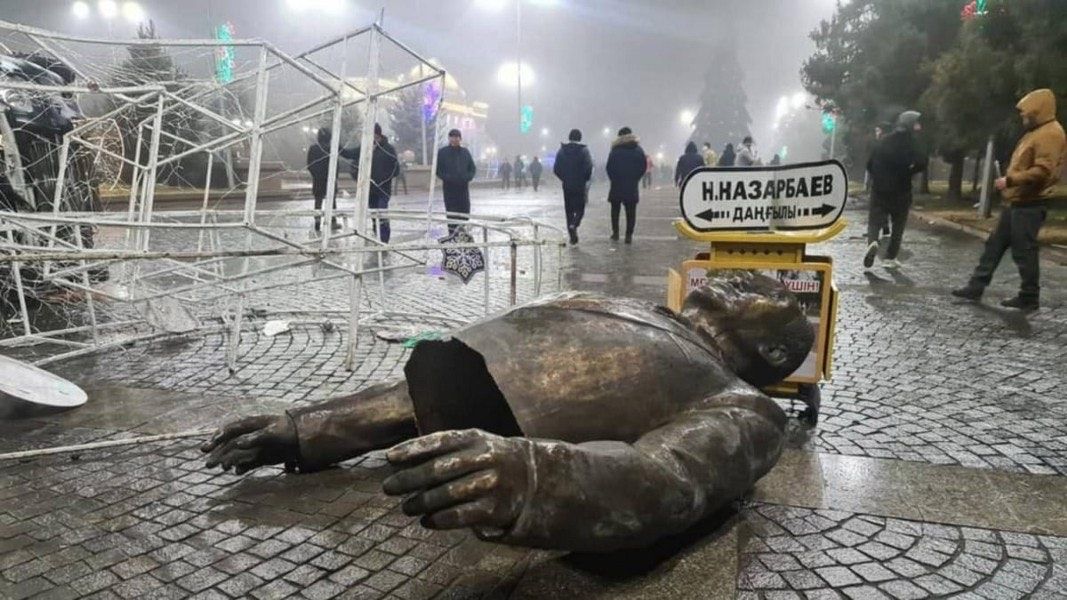
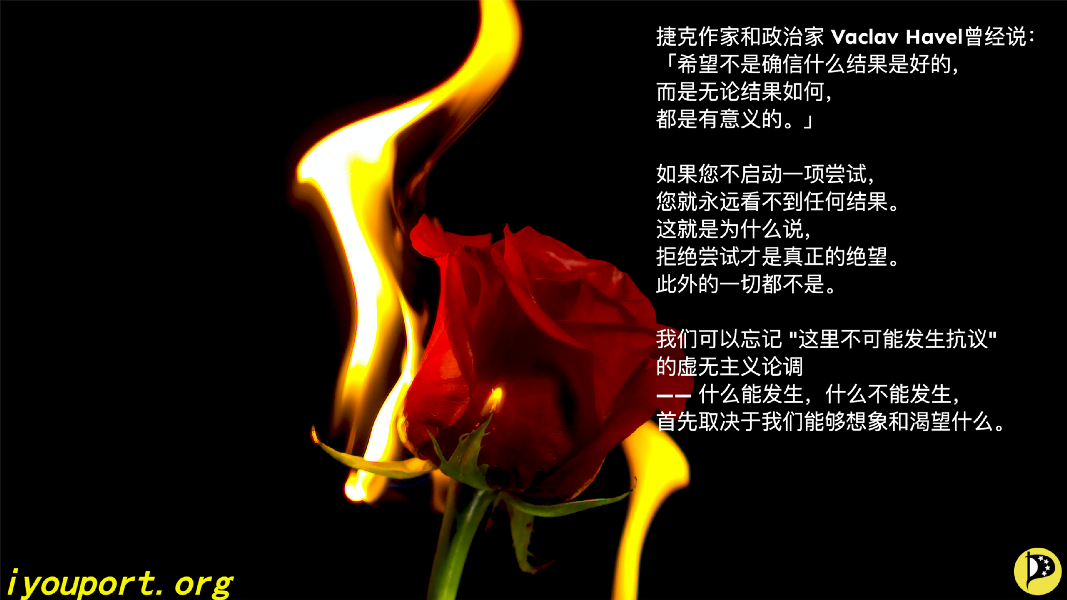
Summary: A Russian perspective
In the following text, a Russian anarchist considers the impact of the uprising in Kazakhstan on the region.
After decades of repression and failure, why does hope still rise again and again, as we see in Belarus, Russia, Kyrgyzstan, and now Kazakhstan? Why do people continue to struggle after our relatives, friends and neighbors have fallen, been shot by the police or the military? Why do we still have these opportunities to experience the waves of change and excitement that give us a taste of all that our lives might be like?
You can feel some answers in the lyrics of Kazakh musician Ermen Anti, from a band called Adaptation:
“No matter how they shot, there weren’t enough bullets.
No matter how they crush, nevertheless,
Fair anger continues to sprout;
Children of Prometheus, bring fire to cold people.”
When we look at the events of the past few decades in Kazakhstan, Belarus, Russia and Kyrgyzstan, we need to ask, what can cooperation between initiatives and movements fighting for liberation achieve at the international level? Such ties allow us to exchange political and cultural experiences and strengthen the common cause that the peoples of these countries should share. However, anarchist movements are disconnected from the extent of the interconnectedness and interdependence of the economic and political realities of these countries.
Kazakhstan can serve as a reference case for what may happen tomorrow in Russia, Belarus and other countries in this part of the world. Today, people in Russia fear for their lives at the thought of expressing any kind of dissent. But tomorrow we can see the shadows of Zhanauzin and Almaty in the cities of Russia , Belarus (again! ) and other countries. We can forget the nihilistic argument that “protests can’t happen here” – what can and cannot happen depends, first of all, on what we can imagine and desire .
When situations unfold like what we are seeing in Kazakhstan today, we can see how important it is to connect with other people in our society.
Today, we are surprised – we may not even often be among the people on the streets, shoulder to shoulder fighting and defending, or doing other important work in support of the uprising. To be prepared and connected, we need to be able to confront contradictions within our communities and within society as a whole. In situations like this, we need to be able to communicate our ideas and bring suggestions to those around us. Contradictions, divisions and isolation are killing comrades who could have given their lives to the struggle.
When I ask myself what it will take for us to see each other in the streets and in people's homes, to walk together, to look out for each other, to fight together, I'm imagining the different ways we can approach each other, making it possible for the other to join the struggle and develop together , help each other survive.
We can ask ourselves: What do we need to change in how we treat each other and others, in how we treat struggles and our movements, so that they become a source of life and inspiration that can provide people with ways of thinking, fighting, and living?
For example, we remember the feminist movement in Kazakhstan, which for some years in the 2010s was the center of public attention and discussion, published a feminist magazine that raised the topic in an unprecedented way in Kazakhstan, along the lines of domestic violence Disconnects with patriarchy connect many groups and communities. This is an example of how we situate ourselves on issues that connect us to other, wider people in society.
Those of us in the former Soviet Union have an impressive legacy of resistance and uprising to draw from. We need to connect with each other so that we can capitalize on this legacy.
Solidarity and support to everyone fighting in Kazakhstan and all post-Soviet countries! As they say, the dogs may bark, but the caravan will move on. Today they may step on our necks, but the struggle will not stop and those who fell on the streets of Almaty will not be forgotten!
Overthrowing the government is necessary, but it is not enough: to withstand future political and economic impositions, ordinary people will have to develop collective power on a horizontal, decentralized basis. This is not the work of a day or a year, but of a generation.
⚪️
Like my work? Don't forget to support and clap, let me know that you are with me on the road of creation. Keep this enthusiasm together!

- Author
- More